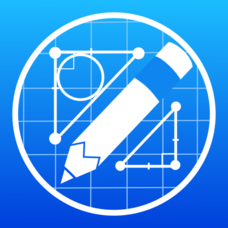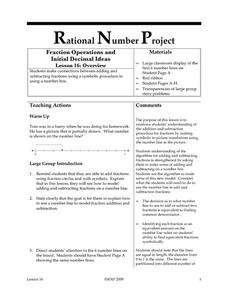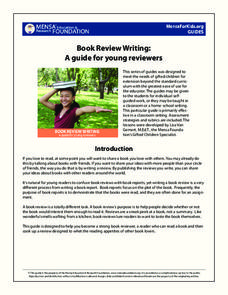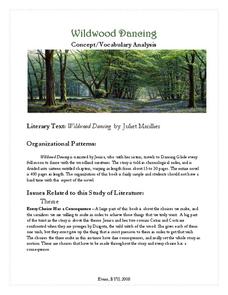Little 10 Robot
Operation Math Code Squad
Your mission, if you decide to accept it, is math skills practice. In this app, Mission Impossible meets basic number operation skills, and your students are the secret agents.
California Academy of Science
Earthquakes and Tectonic Plates
Here is a comprehensive package in which middle schoolers learn about types of seismic waves, triangulation, and tectonic plate boundaries. Complete vocabulary, colorful maps, and a worksheet are included via links on the webpage. You...
Art Institute of Chicago
Color Combinations
Explore color through an examination of pointillism and light. Class members view Georges Seraut's famous painting on a computer, zooming in and out to see the details and effects of the technique. They then cover how light and color are...
Simon and Schuste
Gone with the Wind - Reading Group Guide
Love, war, race, class, religion, honor are just a few of the topics readers of Gone with the Wind are prompted to discuss by the questions included in this very thoughtful reading guide.
Project Articulate
Textured Landscapes with Grant Wood
Explore the world of textured landscapes through the eyes of the famous artist, Grant Wood. Here is an elementary art lesson in which scholars learn about Grant Wood's life, view his work, draw their own textured landscape, and then...
Star Date
Astronomy Day from McDonald Observatory Solar System Scale Activity
Add a visual aid to your solar system lessons. Enthusiastic astronomers create a model depicting the nine planets and their distance from the sun.
Mathematics Assessment Project
Middle School Mathematics Test 6
A thorough math test divides the content into two 40-minutes sections, covering material through algebra and geometry. Problems incorporate analysis and applied problem solving.
Teach Engineering
Start Networking!
Class members create their own social networks by collecting signatures before graphing the interactions with their fellow classmates. The degree distribution of the simulated social network is determined by calculating the degree of...
K12 Reader
Antonym Animals
What's the antonym for wild? What's the opposite of young? Young readers identify the antonyms in a series of ten sentences. Next, they jot down the word pairs to reinforce the relationship between each set of antonym.
Florida Center for Reading Research
Phonological Awareness: Phoneme Manipulating, What's Left?
Scholars subtract initial phonemes from given picture word cards to create new words. Feet becomes eat, and shelf becomes elf.
Bytes Arithmetic
Geometry Pad+
Graphing paper, pencil, ruler, protractor, and compass, all get replaced or supplemented with this dynamic geometry application. Here, you can create, move, and scale many different shapes, as well as, explore and change their properties...
Name Parts of a Computer and Terms for Interface Elements
Familiarize your young learners with the parts of a computer and some basic key terms relating to technology. As the teacher demonstrates using an LCD projector, class members practice moving a mouse, opening the Internet, typing in a...
University of Minnesota
Fraction Operations and Initial Decimal Ideas
Add another strategy to the toolboxes of young mathematicians with this elementary math lesson on using number lines to add and subtract fractions.
NWT Literacy Council
How to Kit: Readers Theatre
Immerse your class in a good story with an extensive resource featuring reader's theater techniques. The worksheets are designed for both teacher and student, and carefully explain how to organize, write, and perform stories in a...
English With Jennifer
Design Team Challenge: A Pair Activity to Practice Prepositions of Place
Test your pupils' skills with indoor decorating while finding out how well they understand prepositions of place. After practicing living room vocabulary, pairs furnish a room by drawing in items. They then present their room to the...
Novelinks
The Book Thief: Concept Analysis
Designed for teachers who plan on using Markus Zusak's The Book Thief, this packet includes background information about the author, themes addressed in and issues raised by the novel, a list of research and project ideas, and links to...
Houghton Mifflin Harcourt
American Stories: Extra Support Lessons (Theme 2)
Here's a packet designed especially for those kids who need extra support with the basic concepts in the Houghton Mifflin Harcourt thematic units on American stories.
Novelinks
The Cure: Concept Vocabulary Analysis
Considering a study of science fiction, speculative fiction, and/or dystopian fiction? Check out this concept analysis of Sonia Levitin's The Cure. The guide provides enough information to let you know if her novel would fit your needs.
Novelinks
The Good Earth: Concept Analysis
Designed for teachers, this resource provides an overview of Pearl S. Buck's Pulitzer Prize winning novel, The Good Earth. Information about the organizational pattern of the story, issues and themes addressed, historical background on...
MENSA Education & Research Foundation
Book Review Writing: a Guide for Young Reviewers
Encourage scholars to share their love of reading with informative and engaging book reviews. Here, you'll find a series of guides that walk learners through the review writing process. Included in the collection is information about...
Novelinks
Wildwood Dancing: Concept/Vocabulary Analysis
Considering including Juliet Marillier's young adult novel, Wildwood Dancing as part of your language arts curriculum? Check out an overview that examines some of the themes and issues presented by the novel.
Flipping Physics
AP Physics 1: Rotational Kinematics Review
A comprehensive review of the rotational kinematics covered by the AP Physics 1 test, this fast-paced video is designed to help scholars review material they have already been taught.
Yummy Math
US Holiday Candy Sales
Candy is a big business! Calculate the amount of money consumers spent on major holidays—Easter, Halloween, Christmas, Hanukkah, and Valentine's Day—based on the total amount of candy sales from 2011 and the percentage of each holiday's...
LABScI
Potential and Kinetic Energy: The Roller Coaster Lab
Ron Toomer, a famous roller coaster designer, suffered from motion sickness. Pupils design their own roller coasters, learning about potential and kinetic energy in the process. Labs focus on the importance of drop height, energy...
Other popular searches
- Personal Space Circle Time
- Circle Time Activities
- Circle Time Social Skills
- Preschool Circle Time
- Preschool Ideas Circle Time
- Circle Time Reception Class
- Circle Time Ks2
- Circle Time Relationships
- Circle Time Fall Activities
- Circle Time Anti Bullying
- Mass Media Circle Time
- Circle Time (Love)

























